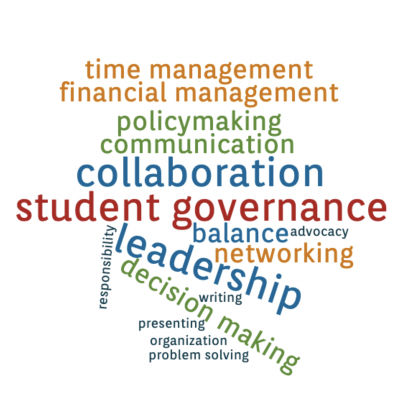Develop Professional Skills with the Graduate and Professional Student Assembly

May 17, 2021
By Katya Hrichak
Experts say that investing time in graduate student governance can benefit your future career. Subject-matter expertise can make you a strong candidate for employment, but demonstrated application of real-world skills developed through governance opportunities can tip the scales in your favor.
Recent Inside Higher Ed articles examining the relationship between skills developed through student involvement in campus government overlap with the skills employers most often seek in new hires. These organizations foster teamwork and collective problem-solving as student volunteers work toward common goals. Learning to communicate and present ideas succinctly and compellingly to students across different programs, fields, and disciplines is a skill that will help students be successful in nearly any future career.
“The communication and leadership skills students develop through their involvement in the Graduate and Professional Student Assembly (GPSA) are invaluable and can help students clearly communicate their ideas and reach a shared understanding of their concerns, expectations, and goals. This will help them now and in their future careers,” said Kathryn J. Boor, dean of the Graduate School and vice provost for graduate education. “GPSA membership also provides students with the opportunity to meet and build a network with students from other fields across the university.”
For several members of the GPSA, involvement has also meant gaining more nuanced professional knowledge. GPSA President David Dunham, a doctoral candidate in Germanic studies, finds that his role has provided insight into how a research university, like Cornell, operates. This insight will help him understand other large institutions and will provide context for future faculty positions as well.
“Early-career academics are often tasked with leading departments,” he said. “My time in the GPSA has better prepared me for those opportunities.”
Caroline Steingard, microbiology doctoral candidate, expected to manage budgets, gain leadership skills, and practice organization and time management when taking on the role of GPSA finance commission chair. In addition to honing these competencies, she gained “invaluable experience” as she wrote and presented policy changes, which has led her to consider a future career in science policy.
“Whether you stay in academia or move to industry/non-profit sectors, students need skills beyond just research,” said Kavya Krishnan, GPSA vice president of communications and soil and crop sciences doctoral candidate. “Becoming involved with organizations like the GPSA can help you gain valuable professional skills.”
Alumni Aravind Natarajan, Ph.D. ’19, and Evan Cortens, Ph.D. ‘14, see direct connections between their professional successes and time spent with the GPSA. Like Dunham, Natarajan came to understand university operations through his various roles with the GPSA. Now, as a postdoctoral research fellow at Stanford University, he relies on the collaborative spirit, work ethic, and time management skills fostered during his time with the GPSA.
“My efforts with the GPSA have taught me many tangible and intangible skills that continue to hold me in good stead,” he said. “It taught me how to forge collaborations and work together to achieve success, even with folks that I may passionately disagree with on other topics. Further, my experiences in the GPSA are a constant reminder of the value of diversity in thought.”
As director of institutional research and planning at Mount Royal University, Cortens frequently relies on lessons learned as a former GPSA president. Working with administration, collaborating across disciplines, developing leadership skills, and managing finances are some of the takeaways that he uses in his current role.
“My GPSA experience opened my eyes to a range of career possibilities and helped me develop the skills that got me in the door and then helped me succeed,” he said. “I would encourage every Cornell graduate student to find a way to get involved with the GPSA. The experience was transformative for me, and I have no doubt it will be for others as well.”
This story is also available on the Cornell Chronicle website.
Related:
